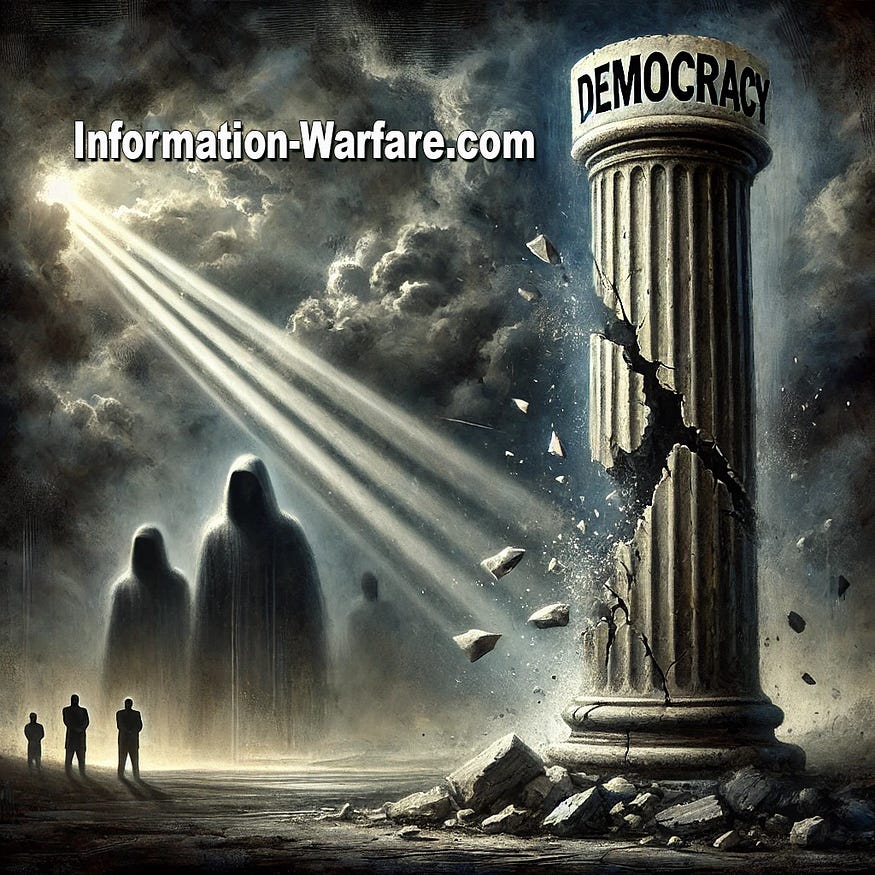The Fragility of Democracy
How Information Warfare Threatens to Dismantle Freedom
As authoritarian influences infiltrate American politics, the fragility of democracy becomes starkly evident.

The rise of disinformation and foreign interference underscores the urgent need for an informed citizenry and vigilant defense of democratic values.
In the annals of history, democracy has always been a delicate and fragile construct. It is a system that requires constant vigilance, participation, and the unwavering commitment of its citizens to survive. Yet, in recent years, we have witnessed just how easily the pillars of democracy can be shaken, even in a country as historically stable as the United States. The rise of Donald Trump and the pervasive influence of Russian interference have revealed the terrifying vulnerability of democratic institutions, raising urgent questions about the future of governance not just in America, but around the world.
The Infiltration of the GOP: A Case Study in Subversion
The story of how the Republican Party, once a bastion of conservative principles and democratic values, has been subverted by authoritarian influences is a chilling testament to the fragility of democracy. What began as a populist movement under Donald Trump quickly morphed into something far more insidious — a vehicle for undermining the very foundations of American democracy.
Trump’s ascendancy was not merely the result of domestic discontent; it was aided and abetted by a foreign adversary with a long history of destabilizing democratic nations: Russia. Through a sophisticated campaign of disinformation and covert financial support, Russia has managed to exert influence over the GOP, leveraging political action committees (PACs) and other channels to fund candidates who align with its interests. This infiltration has allowed Russia to gain a foothold in one of America’s major political parties, a development that would have been unthinkable just a few years ago.
The Power of Information Warfare
The Russian strategy is a textbook example of information warfare — a tactic that aims to disrupt and control by manipulating the flow of information. By sowing discord, spreading falsehoods, and fueling conspiracy theories, Russia has effectively flipped the loyalty of a significant portion of the American electorate. The ease with which this was accomplished is a stark reminder of how vulnerable democracies are to such tactics.
Information warfare operates on a simple premise: control the narrative, and you control the people. In the age of social media, this has become easier than ever. False information spreads faster than the truth, and once entrenched in the public consciousness, it is nearly impossible to dislodge. This phenomenon has been weaponized by foreign powers and domestic actors alike, who exploit the weaknesses in democratic societies to advance their own agendas.
The Erosion of Informed Citizenship
At the heart of democracy is the idea of an informed citizenry — individuals who are capable of making rational decisions based on facts and reasoned debate. However, the rise of disinformation has eroded this foundation, leaving many citizens confused, divided, and distrustful of traditional sources of authority. This is precisely what makes democracy so fragile: it relies on the active participation of its citizens, who must be vigilant and discerning in their consumption of information.
Without an informed citizenry, democracy cannot function. Elections become mere exercises in manipulation, where voters are swayed not by policies or principles, but by the most compelling lies. This is the dark reality that has begun to unfold in the United States, where large segments of the population have been led to believe in dangerous falsehoods, from the notion of a “stolen” election to the vilification of the free press.
The Global Implications
The fragility of American democracy is not an isolated phenomenon; it is a warning to the world. Other democracies are equally vulnerable to the tactics of information warfare. Countries across Europe, Asia, and Africa have seen similar attempts to subvert their political systems through disinformation and covert influence operations. The stakes could not be higher: the collapse of one democracy can have a domino effect, weakening others and emboldening authoritarian regimes.
We are closer than we might think to witnessing the dismantling of democratic systems on a global scale. The combination of sophisticated disinformation campaigns, the erosion of public trust, and the infiltration of political institutions by foreign powers poses a direct threat to the survival of democracy as we know it.
The Urgency of Vigilance
The preservation of democracy requires more than just passive support; it demands active engagement from all citizens. We must recognize the threat posed by information warfare and take steps to counter it. This includes holding our political leaders accountable, demanding transparency in campaign financing, and promoting media literacy among the public.
Moreover, we must be vigilant in protecting the integrity of our elections and the institutions that uphold democratic governance. This is not just the responsibility of politicians or journalists; it is the duty of every citizen who values freedom and the rule of law.
Conclusion: Democracy on the Brink
The events of recent years have shown just how easily democracy can be undermined. The infiltration of the GOP by authoritarian interests, fueled by Russian disinformation and covert financial support, is a stark reminder that no democracy is invulnerable. The fragility of our system is evident, and the consequences of inaction are dire.
If democracy is to survive, it must be defended with vigilance and determination. We are at a critical juncture, where the choices we make today will determine the future of governance not just in the United States, but around the world. The time to act is now, before the forces of disinformation and authoritarianism gain an irreversible foothold in our political systems.


